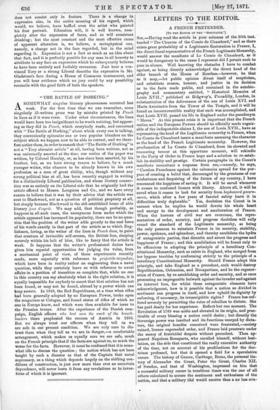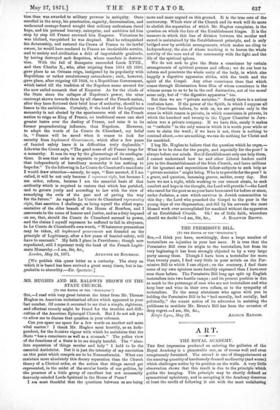LETTERS TO THE EDITOR.
A FRENCH PRETENDER.
[TO THE Eprros OF THE "SPECTATOR."] Sm,—Having read the article in your columns of the 20th inst. headed "The Chances of the Comte de Chambord," and as there exists great probability of a Legitimate Restoration in France, I, the direct lineal representative of the French Legitimate Monarchy, would answer the manifesto of Le Comte de Chambord, as it would be derogatory to the cause I represent did .1 permit such to pass in silence. Well knowing the obstacles I have to combat against, as being directly acknowledged the direct head of the elder branch of the 'House of Bourbon—however, be that as it may,—let public opinion divest itself of scepticism, and substitute reason, honour, and justice in its decision as to the facts made public, and contained in the autobio- graphy and commentary entitled, " Historical Memoirs of Louis XVII.," published at Ridgway's, Piccadilly, London, in substantiation of the deliverance of the son of Louis XVI. and Marie Antoinette from the Tower of the Temple, and it will be found an incontrovertible reality that such was accomplished, and that Louis XVII. passed his life in England under the pseudonym " Meves." At this present crisis it is important that the French nation and the European Powers should be officially made cogniz- able of the indisputable claims I, the son of Louis XVII., have as representing the head of the Legitimate monarchy in France, when Le Comte de Chambord issues a manifesto assuming the character as the head of the French Legitimate monarchy. However, the proclamation of Le Comte de Chambord, from its elevated and reassuring tenour at this opportune moment, will rekindle in the Party of Order in France hope and a solution to re-estab- lish its Stability and prestige. Certain paragraphs in the Count's manifesto necessitate a response from me,—namely, he says, "Caution Frenchmen against the calumnies spread for the pur- pose of creating a belief that, discouraged by the greatness of our misfortunes and despairing of the future of my country, I have renounced the happiness of saving it. It will be saved whenever it ceases to confound licence with liberty. Above all, it will be saved when it ceases to look for security from haphazard govern- ments, which after a few years of fancied safety leave it in difficulties truly deplorable." Yes, doubtless the Count is in earnest when he implies he would devote his whole heart and energy to the development and amelioration of France. When the horrors of civil war are overcome, the repre- sentatives of order, security, and progress doubtless will rally round the standard of the Legitimate monarchy, as being the only panacea to reinstate France in its security, stability, power, opulence, and splendour, and thereby annihilate the hydra of antagonistic parties, that disunite and arrest the progress and happiness of France ; and this annihilation will be found only to be efficacious in adopting the principle of a hereditary Con- stitutional Monarchy, such as exists in England, who merged from her bygone troubles by conforming strictly to the principle of a hereditary Constitutional Monarchy. Should France adopt this principle, and take England as a precedent, such would destroy Republicanism, Orleanism, and Bonapartism, and be the regener- ation of France, by re-establishing order and security, and at once presenting an impregnable bulwark against the invader and against its internal foes, for whilst these antagonistic elements have acknowledgment, how is it possible that a nation so divided in sentiment can progress in itself, and how uphold its diginity by enforcing, if necessary, its irrescriptible rights ? France has suf- fered severely by permitting the voice of rebellion to dictate. She has paid dearly for her experience. Reflect but one moment. The Revolution of 1789 was noble and elevated in its origin, and prac- ticable of every blessing a nation could desire ; but directly the Sovereign power was insulted and its functions usurped by dicta- tors, the original benefits conceived were frustrated,—society ruined, licence superseded order, and France laid prostrate under the mercy of fratricidal despots without precedent. Then ap- peared Napoleon Bonaparte, who enrolled himself, without hesi- tation, on the side that constituted the really executive authority of the time, not on account of his predilections for the doc- trines professed, but that it opened a field for a speculative career. The history of Greece, Carthage, Rome, the personal his- tory of Alexander the Great, Peter the Great, Charles MI. of Sweden, and that of Washington, impressed on him that a successful military career in troublons times was the one of -all others calculated to arouse the sentiment and enthusiasm of the nation, and that a military idol would receive then a no less ova-
tion than WS awarded to military prowess in antiquity. Once enrolled in the army, his penetration, sagacity, determination, and undaunted courage feared naught that military enthusiasm dared hope, and his personal bravery, enterprise, and ambition led him atep by step till France crowned him Emperor. Victorious he was idolized, vanquished he was despised. Had he relinquished his dictatorship, and restored the Crown of France to its lawful owner, he would have rendered to France an incalculable service, and to society and civilization a debt of imperishable gratitude, by having destroyed mob despotism, whose mandate is destruc- tion. With the fall of Bonaparte succeeded Louis XVIII., and then Charles X., who, after reigning from 1814 till 1830, gave place to an Orleans reign, instigated by its popularity with Republican or rather revolutionary antecedents ; such, however, gave place, after reigning till 1848, to a Republican Government, which lasted till the tradition of the Napoleon name secured for the now exiled monarch that of Emperor. As for the chiefs of the State since the collapse of Napoleon's power, the utter contempt shown towards them by all classes of the French nation, after they have fluttered their brief hour of authority, should be a lesson to the ambitious. Certainly, if the head of the Legitimate monarchy is not elected by the spontaneous wish of the French station to reign as King of France, no traditional name can shed greater lustre over the destiny of France, and raise it to its former preponderating influence, than Napoleon. However, to adopt the words of Le Comte de Chambord, my belief "France will be saved when it ceases to look for -security from haphazard Governments, which after a few years --of fancied safety leave it in difficulties truly deplorable." Likewise the Count says, "The good sense of all Franee longs for a monarchy. It sees its way by the glimmerings of its conflagra- tions. It sees that order is requisite to justice and honesty, and that independently of hereditary monarchy it has nothing to hope for." To the following in Le Comte de Chambord's manifesto I would draw attention—namely, he says, "Rest assured, if I am -called, it will be not only because I represent right, but because I am order, reform, because I am the essential basis of that Authority which is required to restore that which has perished, :and to govern justly and according to law with the view of remedying the evils of the past and of paving the way for the future." As regards Le Comte de Chambord representing ofight, that assertion I challenge, as being myself the eldest repre- sentative of the elder branch of the House of Bourbon, and I asseverate in the name of honour and justice, and as a duty imposed en me, that, should the Comte de Chambord succeed to power, -and the claims I myself represent be suffered to fall in abeyance, in Le Comte de Chambord's own words, "Whatsoever precautions may be taken, all haphazard governments not founded on the principle of Legitimacy, after a few years of fancied safety, will dmve to succumb." My faith I place in Providence ; though now mepudisted, still I represent truly the head of the French Legiti- mate Monarchy.—I am, Sir, &c., London, May 24, 1871. AUGUSTE DE BOURBON.
[We publish this queer letter as a curiosity. The story on :which it is based has been revived a great many times, but is im- ,probable to absurdity.—En. Spectator.]



































 Previous page
Previous page